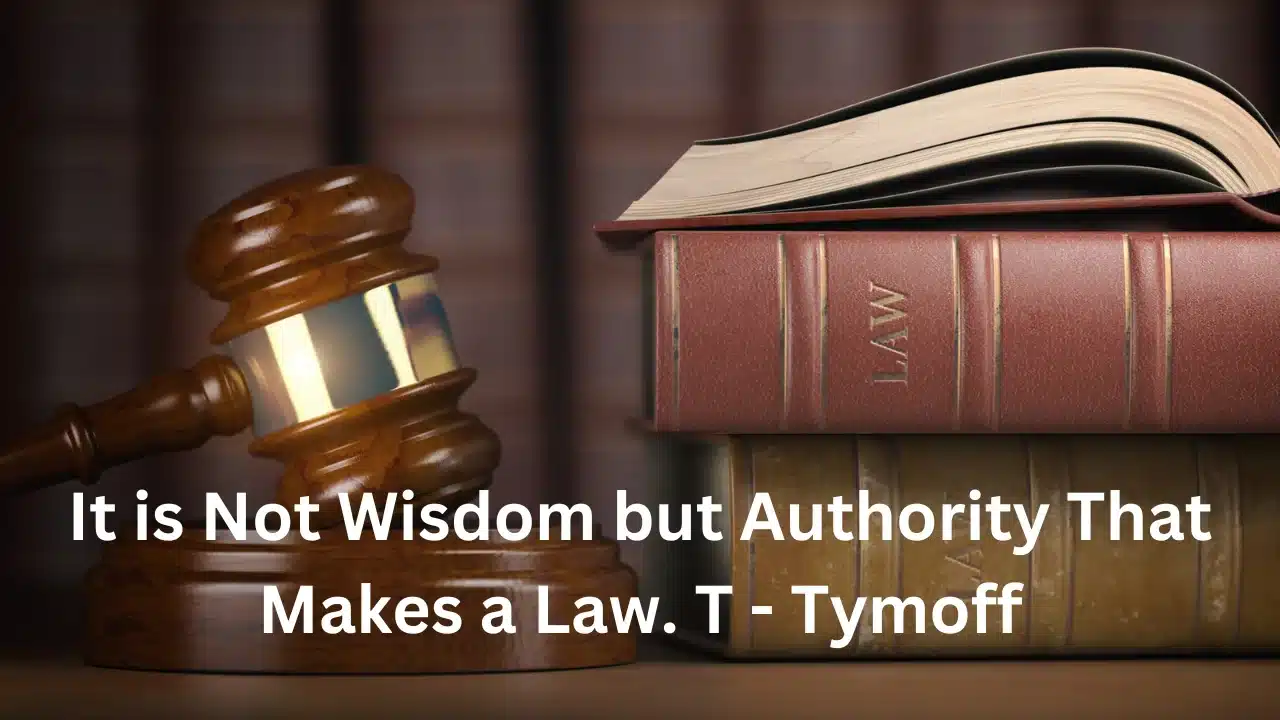In the realm of governance and societal order, the interplay between wisdom and authority is a topic of perennial debate. Many argue that the essence of a law lies in its inherent wisdom, crafted through rational deliberation and moral reasoning. However, others contend that the true force behind laws is not wisdom but authority—the power vested in institutions and individuals to enforce compliance. In this article, we delve into the intricate relationship between wisdom and authority in the context of lawmaking, exploring their respective roles and implications.
I. Introduction
A. Definition of Wisdom and Authority
Wisdom, often associated with sagacity and discernment, encompasses the ability to make sound judgments based on knowledge and experience. Authority, on the other hand, refers to the legitimate power to command obedience and enforce laws or rules.
B. The Relationship between Wisdom and Authority
While wisdom and authority are distinct concepts, they are intricately linked in the realm of lawmaking. The extent to which each influences the formulation and implementation of laws varies depending on cultural, political, and historical contexts.
II. Understanding Wisdom
A. What Constitutes Wisdom?
Wisdom transcends mere intelligence or knowledge; it encompasses a deep understanding of human nature, ethical principles, and the consequences of one’s actions. Wise decisions are characterized by prudence, foresight, and a commitment to the common good.
B. The Role of Wisdom in Decision-Making
In the context of lawmaking, wisdom plays a crucial role in guiding legislators and policymakers to enact just and equitable laws. Drawing upon accumulated wisdom from philosophy, ethics, and jurisprudence, lawmakers strive to address societal needs while upholding fundamental rights and values.
III. The Power of Authority
A. Defining Authority
Authority derives its legitimacy from various sources, including constitutions, legal systems, and social consensus. It empowers institutions and individuals to exercise control and enforce compliance with established norms and regulations.
B. Authority in Legal Systems
In legal contexts, authority manifests through the hierarchical structure of judicial systems, the prerogatives of lawmakers, and the mandates of law enforcement agencies. The effectiveness of laws hinges on the perceived legitimacy and credibility of the authorities tasked with their enforcement.
IV. The Law: Wisdom vs. Authority
A. Origin and Purpose of Laws
1. Historical Perspective
Throughout history, laws have served as instruments of social order, justice, and governance, reflecting prevailing cultural norms and power dynamics. Ancient legal codes, such as Hammurabi’s Code and the Twelve Tables, sought to codify principles of justice and regulate societal conduct.
2. Contemporary Significance
In modern societies, laws fulfill multifaceted roles, ranging from safeguarding individual rights to promoting economic stability and environmental sustainability. The evolution of legal systems mirrors advancements in governance, technology, and social awareness.
B. The Influence of Wisdom on Laws
1. Philosophical Considerations
Philosophers and legal scholars have long debated the role of wisdom in lawmaking, with some advocating for a rational, deliberative approach informed by ethical principles and empirical evidence. The concept of “natural law,” rooted in moral reasoning and universal truths, underscores the importance of wisdom in shaping just laws.
2. Practical Implications
In practice, the application of wisdom in lawmaking requires policymakers to balance competing interests, anticipate unintended consequences, and adapt to changing societal dynamics. Pragmatic considerations, such as feasibility, enforceability, and public acceptance, often influence legislative outcomes.
C. The Role of Authority in Lawmaking
1. Legal Frameworks
Authority provides the institutional framework within which laws are promulgated, interpreted, and enforced. Constitutions, statutes, and judicial precedents delineate the scope of governmental powers and the rights of citizens, establishing a framework for legal decision-making.
2. Enforcement Mechanisms
The effectiveness of laws depends not only on their content but also on the enforcement mechanisms employed by authorities. Law enforcement agencies, courts, and regulatory bodies play pivotal roles in upholding legal order and ensuring compliance with statutory requirements.
V. The Debate: Wisdom or Authority?
A. Philosophical Perspectives
Philosophers and legal theorists continue to grapple with the question of whether wisdom or authority should take precedence in lawmaking. Some argue for a synthesis of both, emphasizing the importance of informed decision-making guided by ethical principles and enforced through legitimate authority.
B. Practical Applications
In practical terms, the efficacy of laws hinges on a delicate balance between wisdom and authority. While wisdom informs the substance and rationale of laws, authority provides the means to enforce them and maintain social order. The challenge lies in aligning these two elements in a manner that promotes justice, fairness, and the common good.
VI. Conclusion
In conclusion, the adage “it is not wisdom but authority that makes a law” encapsulates the complex interplay between intellectual insight and institutional power in the realm of governance. While wisdom informs the substance and legitimacy of laws, authority empowers institutions to enforce compliance and uphold societal order. Ultimately, a harmonious synthesis of wisdom and authority is essential for the creation and maintenance of just and equitable legal systems.
FAQs (Frequently Asked Questions)
- What role does precedent play in shaping legal authority? Precedent, established through prior judicial decisions, serves as a cornerstone of legal authority by providing guidance and consistency in legal interpretation and application.
- Can laws be just without the consent of the governed? The legitimacy of laws often hinges on the consent or tacit acceptance of the governed, reflecting broader principles of democratic governance and social contract theory.
- How do cultural and societal values influence the formulation of laws? Cultural norms, values, and traditions play a significant role in shaping legislative agendas and priorities, reflecting diverse perspectives on morality, justice, and individual rights.
- Is there a universal standard for wisdom in lawmaking? The concept of wisdom in lawmaking is inherently subjective and context-dependent, varying across cultures, legal traditions, and philosophical perspectives.
- What safeguards are in place to prevent the abuse of legal authority? Legal systems often incorporate checks and balances, constitutional safeguards, and mechanisms for accountability to mitigate the risk of arbitrary or abusive exercise of authority.



